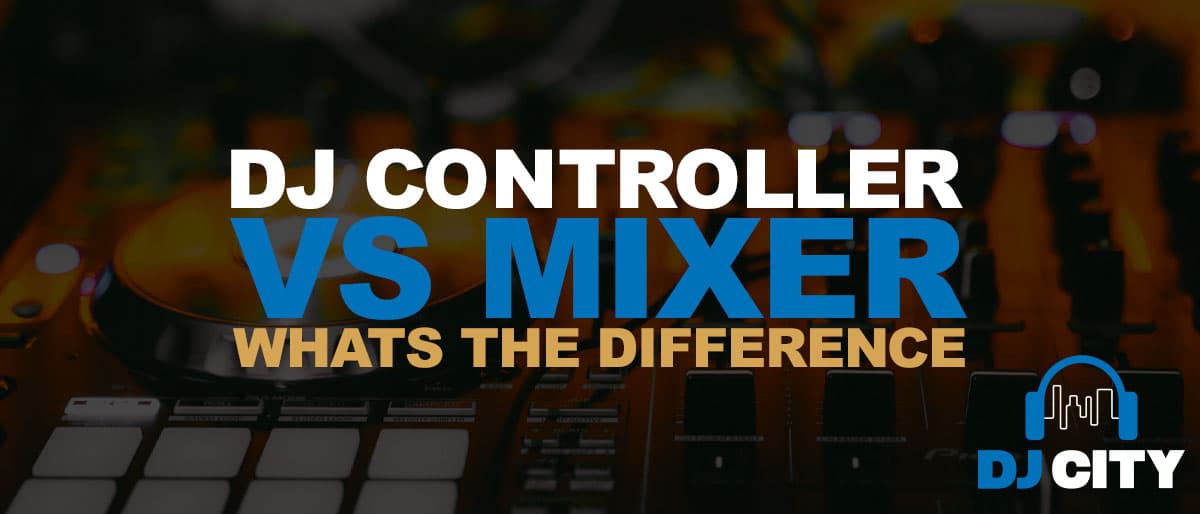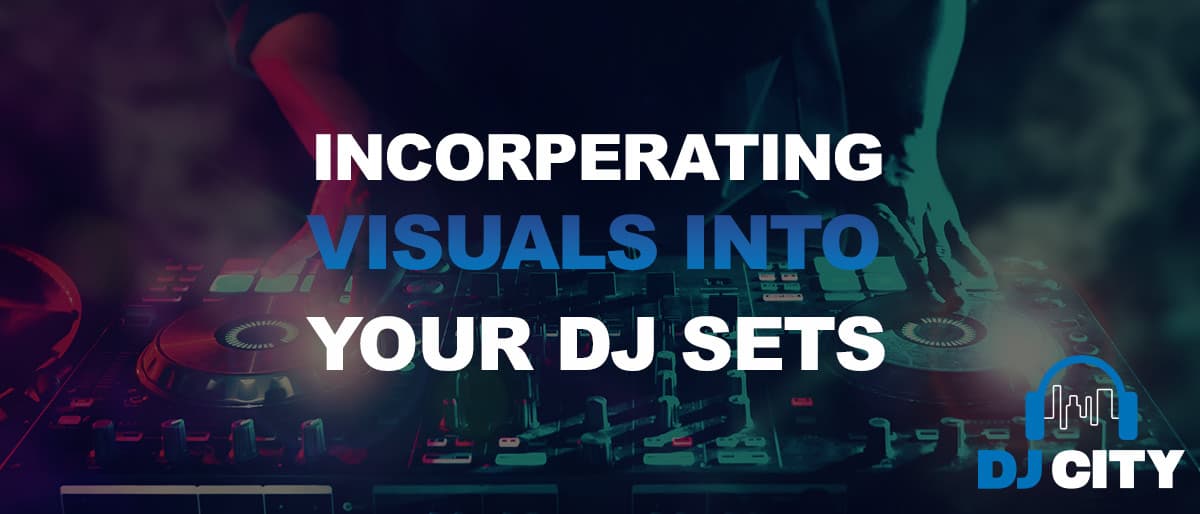
What’s The Difference Between a DJ Controller and Mixer?
If you’re a seasoned DJ, you might be sitting here wondering why this article even needs to be made! But we all start somewhere, and this is a question we get asked almost every day! What’s the difference between a DJ Controller and a DJ Mixer?
To put it simply, a DJ Controller is an all-in-one solution that mimics the setup of two turntables/CDJs and a DJ Mixer. Offering a much more affordable and also portable solution for mixing your favourite tracks without having to dig deep into your pockets to buy a DJ Mixer as well as 2 x Turntables or CDJ/Media Players.
Let’s take a closer look at the differences of both so you can work out which setup is going to be the best for you!

DJ Controller
We touched on what a DJ Controller is briefly already. To sum it up, a DJ Controller is a single unit that contains two turntables and a mixer. In most cases, you would then connect your DJ Controller to your laptop which will then control your digital DJ software. So whether that’s Rekordbox, Serato, Traktor, Virtual DJ, or something else. Then, you’ll have access to your entire library of digital music to mix within seconds.
However, you can also opt for a (generally more expensive) Standalone DJ Controller or All-in-One DJ System which operates in a similar way. The difference here though is that a Standalone DJ Controller uses built-in DJ Software so you can do everything on the one unit. Eliminating the need for a laptop altogether, all you’ll need are some speakers and a USB stick with your music on!
So what do you get with a DJ Controller and what limitations do you have?
DJ Controllers usually give you 2 x turntable jog wheels; 2 to 4 channels; EQ Knobs; FX Pad Controls; A Digital Display; Crossfader; and often also come bundled with DJ Software. A DJ Controller setup is also going to be a lot smaller than an industry-standard CDJ & Mixer combination, but that can be both a positive or a drawback depending on how you look at it.
On the one hand, you’re getting a layout very similar to what you’ll find in the DJ Booths at clubs. Yes, it’s going to be a much smaller setup, but that just gives you more flexibility and portability. Allowing you to take it on the road and mix practically anywhere at any time.
Above all, a DJ Controller is a great option for mixing at home, and is the most affordable option if you’re just getting started. It’s worth checking out a few of the options below.
But if you’re looking to emulate a club-style setup, or you want to scratch, battle, or mix with traditional vinyl; then a classic turntable and mixer setup is going to be your best option.

DJ Mixer
On the contrary, a DJ Mixer offers a much more versatile solution for mixing music using various formats. Giving you control over the volume, EQ, effects, and sound processing of all of its inputs which then sends the audio out to amplifiers and speakers for your audience to hear. Generally with a lot more inputs and outputs than a DJ Controller, a DJ Mixer is capable of connecting CDJs, Beat Pads, Guitar FX Pedals, Vinyl Turntables, and DJ Effects Controllers.
Like DJ Controllers, there’s no one-size-fits-all solution when it comes to Mixers and you’ll find different options for every type of DJ in the scene. First, you’ve got your standard Club Mixers like the Pioneer DJM900NXS2 which typically feature 4-Channels and typically set up with a tabletop configuration. Giving you the ability to run effects, filters, delays, and process your sound how you like it. Usually, these mixers are used digitally and are found hooked up to CDJs or another Digital Media Player. There’s even a massive 6 Channel option in the DJM-V10 recently brought out by Pioneer DJ. But if you’re reading this, you probably won’t be needing 6 Channels any time soon.
Another popular form of Mixer is the Battle Mixer. These are generally 2 Channel Mixers with extremely heavy-duty and ergonomic controls and faders. Designed to give you everything you need to show off your flair while spinning vinyl records or making use of a Digital Vinyl System (DVS).
So, if you’re someone looking to emulate a club setup, or you want that classic feeling of spinning vinyl, then getting a DJ Mixer is going to be the right idea for you. Again, keep in mind you will also need to get yourself a couple of turntables to complete your setup! So it might cost you substantially more to get started!
The Comparison
DJ Controller
- DJ Controllers serve as the one piece of hardware essentially featuring two turntables and a mixer built in.
- Generally, DJ Controllers are designed to connect to your laptop running DJ Software. Unless it’s a Standalone Controller with DJ Software built into it.
- DJ Controllers feature 2 Turntable Jog Wheels, 2 or 4 Channels, EQ Knobs, Effects Pads, Digital or No Display at all, Crossfader, Volume Faders & usually come with DJ Software
- Contains Jog Wheels
- Inputs/Outputs usually consist of a USB Connection, Phone/Line Input, Master Out, and a Microphone Input.
DJ Mixer
- DJ Mixer acts as a hardware device that does not necessarily rely on having either a laptop, or DJ software for playing music. It does the job of mixing your tunes, but will require either CDJs or Turntables, and Speakers to function properly
- A DJ Mixer will usually be 2 or 4 Channels with EQ and Effects Knobs, Crossfader, Volume Faders, Digital Display
- No Jog Wheels, you will need to connect a separate turntable source such as a CDJ or Turntable in order to mix music
- Mixers will have a lot more flexibility in terms of inputs and outputs. Including USB, Mic Input, Phono/Line Input, Master and Booth Out, Headphone Out, MIDI Out, AC/Power, and sometimes even more.
Where Do I Start
If you’re new to DJing and you’re still confused, we recommend starting with a 2-Channel DJ Controller. Check out our video below which includes everything you need to get started DJing today!










